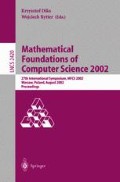Abstract
A set A ⊆ 0,1* is called i.o. Turing-autoreducible if A is reducible to itself via an oracle Turing machine that never queries its oracle at the current input, outputs either A(x) or a don’t-know symbol on any given input x, and outputs A(x) for infinitely many x. If in addition the oracle Turing machine terminates on all inputs and oracles, A is called i.o. truth-table autoreducible. Ebert and Vollmer obtained the somewhat counterintuitive result that every Martin-Löf random set is i.o. truth-table-autoreducible and investigated the question of how dense the set of guessed bits can be when i.o. autoreducing a random set.
We show that rec-random sets are never i.o. truth-table-autoreducible such that the set of guessed bits has strictly positive constant density in the limit, and that a similar assertion holds for Martin-Löf random sets and i.o. Turing-autoreducibility. On the other hand, our main result asserts that for any computable function r that goes non-ascendingly to zero, any rec-random set is i.o. truth-table-autoreducible such that the set of guessed bits has density bounded from below by r(m).
Access this chapter
Tax calculation will be finalised at checkout
Purchases are for personal use only
Preview
Unable to display preview. Download preview PDF.
References
K. Ambos-Spies and A. Kučera. Randomness in computability theory. In P. A. Cholak et al. (eds.), Computability theory and its applications. Current trends and open problems. Proceedings of a 1999 AMS-IMS-SIAM joint summer research conference, Boulder, USA, AMS Contemporary Mathematics 257:1–14, 2000.
K. Ambos-Spies and E. Mayordomo. Resource-bounded measure and randomness. In A. Sorbi (ed.), Complexity, logic, and recursion theory, p. 1–47. Dekker, New York, 1997.
J. Aspnes, R. Beigel, M. Furst, and S. Rudich. The expressive power of voting polynomials, Combinatorica 14(2), p. 135–148, 1994.
J. L. Balcázar, J. Díaz, and J. Gabarró. Structural Complexity, volumes I and II. Springer, 1995 and 1990.
H. Buhrman, L. Fortnow, D. van Melkebeek, and L. Torenvliet, Separating complexity classes using autoreducibility. SIAM Journal on Computing 29:1497–1520, 2000.
H. Buhrman, D. van Melkebeek, K. W. Regan, D. Sivakumar, M. Strauss, A generalization of resource-bounded measure, with application to the BPP vs. EXP problem. SIAM Journal on Computing 30(2):576–601, 2000.
T. Ebert. Applications of Recursive Operators to Randomness and Complexity. Ph.D. Thesis, University of California at Santa Barbara, 1998.
T. Ebert, H. Vollmer. On the Autoreducibility of Random Sequences. In: M. Nielsen and B. Rovan (eds.), Mathematical Foundations of Computer Science 2000, Lecture Notes in Computer Science 1893: 333–342, Springer, 2000.
M. Li and P. Vitányi. An Introduction to Kolmogorov Complexity and Its Applications, second edition. Springer, 1997.
J. H. Lutz. Almost everywhere high nonuniform complexity. Journal of Computer and System Sciences, 44:220–258, 1992.
J. H. Lutz. The quantitative structure of exponential time. In L. A. Hemaspaandra and A. L. Selman (eds.), Complexity Theory Retrospective II, p. 225–260, Springer, 1997.
P. Martin-Löf. The definition of random sequences. Inform. and Control 9(6):602–619, 1966.
E. Mayordomo. Contributions to the Study of Resource-Bounded Measure. Doctoral dissertation, Universitat Politècnica de Catalunya, Barcelona, Spain, 1994.
W. Merkle and N. Mihailović. On the construction of effective random sets. In: Mathematical Foundations of Computer Science 2002, this volume.
P. Odifreddi. Classical Recursion Theory. North-Holland, Amsterdam, 1989.
S. Robinson. Why mathematicians now care about their hat color. NY Times, April 10, 2001.
C.-P. Schnorr. A unified approach to the definition of random sequences. Mathematical Systems Theory, 5:246–258, 1971.
R. I. Soare. Recursively Enumerable Sets and Degrees. Springer, 1987.
S. A. Terwijn. Computability and Measure. Doctoral dissertation, Universiteit van Amsterdam, Amsterdam, Netherlands, 1998.
B. A. Trakhtenbrot, On Autoreducibility. Soviet Math. Doklady, 11:814–817, 1970.
J.H. van Lint. Introduction to coding theory, third edition. Springer, 1999.
K. Wagner and G. Wechsung. Computational Complexity. Deutscher Verlag der Wissenschaften, Berlin, 1986.
Y. Wang. Randomness and Complexity. Doctoral dissertation, Universität Heidelberg, Mathematische Fakultät, INF 288, Heidelberg, Germany, 1996.
Author information
Authors and Affiliations
Editor information
Editors and Affiliations
Rights and permissions
Copyright information
© 2002 Springer-Verlag Berlin Heidelberg
About this paper
Cite this paper
Ebert, T., Merkle, W. (2002). Autoreducibility of Random Sets: A Sharp Bound on the Density of Guessed Bits. In: Diks, K., Rytter, W. (eds) Mathematical Foundations of Computer Science 2002. MFCS 2002. Lecture Notes in Computer Science, vol 2420. Springer, Berlin, Heidelberg. https://doi.org/10.1007/3-540-45687-2_18
Download citation
DOI: https://doi.org/10.1007/3-540-45687-2_18
Published:
Publisher Name: Springer, Berlin, Heidelberg
Print ISBN: 978-3-540-44040-6
Online ISBN: 978-3-540-45687-2
eBook Packages: Springer Book Archive

